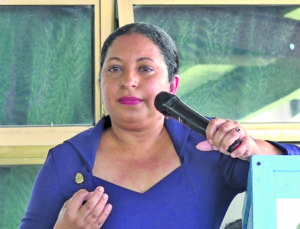Teachers attached to the various institutions in Guyana, from the nursery to tertiary level, are advised to be transformational leaders to the students whom they educate.

These opinions were stated by the Deputy Vice Chancellor of the University of Guyana (UG), Dr Paloma Mohamed, during her address at an educational leadership conference that was hosted by School of the Nations earlier this month.
This is amid the recent discovery, and creation of, the oil and gas sector, which is expected to provide employment for a substantial number of persons. However, she believes Guyana does not possess the calibre of human resources required to work in those respective areas.
Furthermore, Dr Mohamed added that if there are opportunities for employment in Guyana in the future, persons from other countries who meet the qualification requirements will most likely be given the jobs.
“The oil and gas and all of the green technologies and energies that are likely to be unleashed in the country in the next two years. We will not have people at this point to really work in those areas. But in five years, 10 years we need to start thinking about how we teach people, what we are going to create them to do,” Mohamed stated.
Dr Mohammed noted that while there have been some fundamental shifts in the way education is conveyed in the changing world; educational leaders must embrace this change and modify their techniques used in the classrooms to achieve favourable results. As such, new ideas should be formulated to suit the country and its requirements.
“The things that we say and do and teach by modelling or by propagating ideas from elsewhere are not conducive to people living in peace and unity,” she stated.
She explained that Guyanese have a different interpretation of what is expected from the oil industry. As such, Dr Mohamed stated that from this instance, the angle from which students are taught must be modified in order for people to acquire the wider picture as there are certain technicalities that students must be taught to handle.
While focusing on the oil and gas sector, a critical component in Guyana’s economy, Dr Mohamed requested the audiences of predominantly teachers, to question their role in the development of this component of the country and the type of citizens they intend to create.
“It is our job, I believe as a nation, to ensure that kind of education. What are we and who do we want to create? What kind of country do we want to live in? Who are we creating for the next 20 years?” the Deputy Vice Chancellor questioned.
However, while Guyana may not possess the human resources needed right now, the Deputy Vice Chancellor noted that the country’s aspiration should be towards the fulfilment of this necessity for the future, adding, “It has to be our aspiration as teachers to try to create those people to take those jobs.”
To address the improvement of this issue, a similar conference was also hosted by the Education Ministry on Monday, which saw educational leaders from the various administrative regions gaining additional information on leadership qualities.



